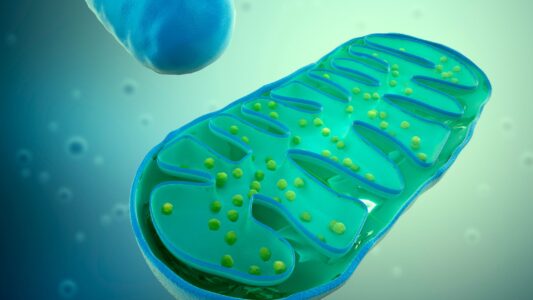
If you’ve ever taken the Full Scan with CBH Energetics, you may have seen your Cellular Metabolism dial stressed.
This dial appears stressed on reports of many of our clients, especially with Mold concerns or Lyme suspicions.
Cellular Metabolism is a part of your biochemistry that brings you on a journey to the very core of your existence. As you read this, trillions of tiny biochemical reactions are taking place inside your body. These reactions are part of a complex and fascinating process known as cellular metabolism. But what does it mean and why should you care?
This blog post aims to simply convey the way cells make energy and the pivotal role this energy plays in health and wellness. We’ll also take a look at nutrients that support healthy cellular energy.
Cellular metabolism is not just a concept that exists in your biology textbooks. It’s a dynamic process happening within you right now, powering your every move, thought, and function. Without it, life as we know it would cease to exist.
Besides digging into the facts about Cellular Metabolism, we’ll also talk about optimizing it with functional nutrition, remedies and wellness practices in the quest of creating balanced health.
What is Cellular Metabolism?
The term ‘cellular metabolism’ might sound intimidating, but it is essentially a term that describes the sum of all chemical reactions that occur within the cells of living organisms. These reactions allow cells to grow and reproduce, maintain their structures, and respond to their environments.
Cellular metabolism is broken down into two categories: anabolism and catabolism. Anabolism involves the synthesis of complex molecules in your cells, providing the building blocks for cell growth and repair. Catabolism, on the other hand, is the breakdown of complex substances, releasing energy that the cells need to function.
Learning about your body is like being handed the keys to a complex, finely-tuned machine that is your body. This knowledge can help you make sense of how different foods and nutrients affect your body, and ultimately, your health.
Some people think that the Cellular Metabolism dial on a CBH Energetics scan refers to overall metabolism. If it is stressed, does this mean I have a slow metabolism? We are not talking about overall caloric burn rate here, but the energy your cells make. That energy is in the form of ATP.
ATP or adenosine triphosphate is a source of energy that is used and stored at the cellular level . Many times referred to as the energy currency of the cell, ATP provides useable energy, and can be broken down to signal the making of DNA/RNA (genetic material) (1).
Understanding the Process of Cellular Metabolism
Cellular metabolism is a series of chemical reactions, but these reactions don’t occur randomly. Instead, they are carefully orchestrated by your body, following specific metabolic pathways. Energy is created, consumed, or converted by every living cell.
There are three metabolic pathways in the body (3):
1. Phosphagen system (ATP-PC system) for immediate energy.
2. Glycolytic system (anaerobic glycolysis) for short-term energy.
3. Oxidative (aerobic) system for sustained (or long-term) energy .
Each metabolic pathway involves a series of steps, each catalyzed by a specific enzyme. These enzymes speed up the reactions, ensuring that your cells can efficiently convert nutrients into energy or use them for growth and repair. The process of cellular metabolism is like a well-oiled machine, working seamlessly to keep your body functioning optimally. However, various factors can affect this process, either enhancing it or disrupting it.
The majority of this energy takes place inside the mitochondria of your cells. What are mitochondria? Think of them as CELL ORGANS. They are organelles inside a cell, that generate the energy a cell needs for all of those biochemical reactions. Liver, muscle, and kidneys have a lot of mitochondria.
Mitochondria use glucose to make ATP. Ketosis can also generate ATP through the breakdown of ketone bodies. Isn’t the body amazing?

Factors Affecting Cellular Metabolism
Numerous factors can influence this process. These can range include genetic predispositions, lifestyle choices and dietary habits. For instance, your age, gender, and activity levels can all impact your metabolic rate – the speed at which your cells carry out metabolic reactions.
On a dietary level, the types of nutrients you consume play a critical role in cellular metabolism. In fact, each nutrient plays a role in Cellular Metabolism.
- Carbohydrates, fats and proteins can be catabolized to release energy.
- Vitamins and minerals that make up part of enzymes are referred to as coenzymes and cofactors.
-
Coenzymes and cofactors are required by enzymes to catalyze a specific reaction.
For instance, proteins, carbohydrates, and fats are metabolized differently by your body, each providing a unique set of benefits and challenges.
Understanding these factors can help you tailor your diet and lifestyle choices to support all the chemical reactions inside your cells. This can have far-reaching implications for your health, energy levels, and overall well-being.
Your Digestive System, and Digestive Health can affect your cellular energy and cellular metabolism. If you cannot digest nutrients, where will the cell get the building blocks for cellular metabolism? This is why our practitioners assess the need for digestive support like digestive enzymes, or minerals like Multi Trace Minerals for cellular metabolism support.
Role of Cellular Metabolism in Energy Production
A key aspect of cellular metabolism is its role in ENERGY production. Every move you make, every breath you take, relies on the energy produced by your cells. This energy comes from the breakdown of nutrients in your diet, a process facilitated by cellular metabolism.
When you consume food, your body breaks it down into its basic components – carbohydrates are broken down into sugars, proteins into amino acids, and fats into fatty acids. These components then enter your cells, where they undergo a series of metabolic reactions to produce energy.
Understanding this process can help you optimize your diet for energy production. By choosing foods that your body can efficiently metabolize, you can ensure you have a steady supply of energy throughout the day.
Impact of Cellular Metabolism on Health and Wellness
The impact of cellular metabolism extends far beyond energy production. It also influences your health and wellness in numerous ways. For instance, it plays a crucial role in maintaining your body’s internal balance, or homeostasis.
Disruptions in cellular metabolism can lead to various health issues, ranging from fatigue and weight gain to more serious issues like blood sugar imbalances and heart issues. On the other hand, optimizing your cellular metabolism can enhance your health, boost your energy levels, and promote longevity.
Moreover, understanding your cellular metabolism can also help you make more informed choices about your diet and lifestyle. This can empower you to take control of your health, paving the way for a healthier and more vibrant life.
Importance of Cellular Metabolism in Functional Nutrition
You’ve probably heard the saying, “You are what you eat.” Well, in the context of cellular metabolism, this couldn’t be closer to the truth. The foods and nutrients you consume directly influence the metabolic reactions within your cells, impacting your overall health and wellness.
Functional nutrition is an approach to diet and health that focuses on optimizing cellular and metabolic functions. It recognizes that each person is biochemically unique, and thus, the nutritional needs can be vastly different from one person to another. Nutritional needs change day to day, season to season, for each individual as well!
While your food choices can influence your cellular metabolism, either boosting it or slowing it down, supplements, lymphatic drainage, and activity can enhance your cell function too.
How to Boost Cellular Metabolism through Functional Nutrition
Now that you understand the intricacies of cellular metabolism, you might be wondering how you can optimize it. One effective way is through functional nutrition – a personalized approach to diet that focuses on supporting your cellular functions.
Functional nutrition emphasizes the importance of whole, nutrient-dense foods that can provide your cells with the necessary raw materials for optimal functioning. It also takes into consideration your unique biochemical makeup, allowing you to tailor your diet to your specific needs.
By making smart food choices, you can enhance your cellular metabolism, boosting your energy levels, creating balanced health, and promoting overall wellness. Remember, it’s not just about eating the right foods, but also about understanding how these foods interact with your unique biochemistry.
Different cells of the body do have different needs. One example is the Immune System. The cells in this system, and there are many types, generally need glucose, amino acids, fatty acids, and vitamin D (2). Other critical nutrients for overall energy production and cellular metabolism are minerals like copper, zinc and magnesium, most of the B Vitamins, the fatty acid ALA or Alpha Lipoic Acid, glutathione, which is our master antioxidant and oxygen.
Wrapping Cellular Metabolism Up …
Decoding the science of cellular metabolism is a daunting task, and you do not need to know all the tasks of ATP production. By understanding what cellular metabolism is, how it works, and how it influences your health, you can make more informed decisions about your diet and lifestyle.
Remember, the journey to health and wellness is a personal one, and there is no one-size-fits-all approach. Bioenergetic testing for creating balanced health understands your uniqueness, and this is represented in the energy pattern that your hair and saliva samples provide.
If you’re ready to take a deeper dive into your cellular health, don’t hesitate to try our Full Scan. Our comprehensive testing, and follow up report, can provide you with valuable insights into the systems, vitamins, minerals and toxins that may be energetically affecting your own Cellular Metabolism.
